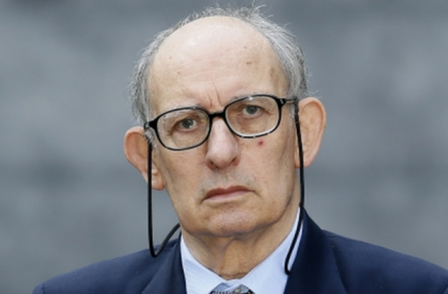
Former News of the World managing editor Stuart Kuttner knew a colleague had information taken from the voicemail of missing schoolgirl Milly Dowler – but denied asking reporters to target mobiles, the phone hacking trial has heard.
He described accusations that he conspired with others to hack phones – allegations which ultimately brought an end to the Sunday tabloid – as "completely false" and "utterly baseless".
Kuttner told the Old Bailey he was aware of only one example of a NotW journalist being in possession of a hacked voicemail message – that of 13-year-old Milly, who was abducted and killed by Levi Bellfield on her way home from school in March 2002.
The 74-year-old told the court he contacted Surrey Police on Saturday April 13, 2002, saying the paper may have "significant information" relevant to the inquiry.
The information came from a voicemail on Milly's phone appearing to offer her a job interview – the message turned out to be left on the schoolgirl's phone erroneously by a recruitment agency who had called the wrong number.
Kuttner said: "The NotW appeared to have, by some method, information that might lead to a missing schoolgirl.
"It was my view… the first and right thing to do was to speak to police."
He told the court the information had been accessed through her voicemail, but denied he "agreed in advance that somebody at the NotW" should hack the phone.
Defence counsel Jonathan Caplan QC asked: "Did you know (convicted phone hacker Glenn) Mulcaire had accessed her voicemail?"
Kuttner replied: "No, I did not."
He said he had no idea when disclosing to police that day about the method of obtaining the information may have constituted a crime.
He also denied being personally involved in phone-hacking and said he did not know if it was a means of extracting information used at the tabloid.
Kuttner added: "My role may have changed from journalist to managing editor, but it is not a form of newspaper journalism I recognise."
Kuttner told the phone hacking trial he wanted his reporters to "knock on doors" and find their own leads, rather than pay private detectives and investigation agencies.
The now-retired tabloid executive also denied authorising weekly payments to Mulcaire in an effort to "cook the books" and conceal the true cost of annual reimbursement for Mulcaire's work.
Kuttner said: "I wanted [journalists] to go and knock on doors, to go to corner shops, to get out and about.
"I was told that on some occasions my method was somewhat out-of-date because electoral registers were readily available to journalists. I don't accept that."
The Old Bailey heard Kuttner sent a memo to senior staff – including co-defendant, former royal editor Clive Goodman – back in 1999 asking them to cut down on detective agency spending. The payments, he said, would have included trying to find out where people live, work and if they are subject to court proceedings.
Kuttner said he believed payments to Mulcaire's companies – Euro Research and Nine Consultancy – were for their work as legitimate research agencies, the same as those employed by newspapers across Fleet Street, he said.
Defence counsel Mr Caplan said prosecutors claimed that Kuttner was complicit in conspiring with others to hack phones "from the beginning", and that Kuttner concealed the size of payments to Mulcaire so as not to alert executives.
The defendant, in his second day giving evidence, replied: "They (the allegations) are, from start to finish, completely false."
Asked to respond to claims that Kuttner knew about payments to Mulcaire for his work hacking phones, the witness said: "The idea that I would conceal payments from the management… is completely baseless.
"It is not me. I did not do that – in this case or any case.
"It is so far removed from my concept of journalism. It (the allegation) is entirely and truly false."
Kuttner, of Woodford Green in Essex, denies conspiring with former NotW editors Rebekah Brooks and Andy Coulson and others to hack phones between 2000 and 2009.
Kuttner was asked to pore over details of payments to high-profile contributors at the NotW by Timothy Langdale QC, for Coulson.
Some members of the jury seemed to demonstrate surprise as Kuttner and Mr Langdale discussed the fees, which included eight people paid at least £100,000 a year for their contributions.
The identities of those celebrities were not read out in court – a move agreed by counsel and the defendant – though they included £100,000 paid to a "football contributor" and £165,000 annually paid to another writer.
Four columnists were on at least £150,000 a year, the court heard.
Kuttner was giving his evidence in the absence of Goodman, whose medical condition is yet to be disclosed following a bout of illness.
Discussing Kuttner's relationship with the former NotW royal editor, the 74-year-old – who has suffered similar ill-health during proceedings – described as "a childish waste of time" Goodman's repeated emails to his newsdesk.
Members of the jury were told Goodman would be getting transcripts of the oral evidence in his absence.
All defendants deny all charges. Kuttner is due to continue giving evidence under cross-examination tomorrow.
Email pged@pressgazette.co.uk to point out mistakes, provide story tips or send in a letter for publication on our "Letters Page" blog
